
P14 CYBERCRIME: How to minimise the risk and counter the threat. P11 CASH FLOW: Staying ahead of the game in a fragile economy. P18 CONTRACT AWARDS: The dawning of what could be the new normal for construction. News and views about the access and scaffolding industry Issue 13 Summer 2020 P8 REACHING THE HEIGHTS Advanced NI Scaffolding scales City Quays 3 NEW
ROLL CALL
for new Scaffolding Association members
SCAFFOLD ERECTION
Northscaff Limited
www.northscaff.co.uk
Oxfordshire Scaffolding Solutions Limited
www.oxfordscaffold.co.uk
Pro Scaff (London) Limited
07836 688269
Scaffteq West Limited www.scaffteqwest.co.uk
Scott Goodliffe Scaffolding Limited 07792 073643
Shaun Hanney Limited www.shaunhanney limited.com
T Scaffolding Limited www.tscaffolding.co.uk
Toplift Scaffolding Limited www.toplift scaffolding.co.uk
Contents
P3 - P5 News
Stories from the access and scaffolding industry
P6 Comment
Robert Candy, CEO of the Scaffolding Association: “Navigating our way through Covid-19”
P7 Opinion
Priscila Escobar, HAKI: “Quality, integrity and sustainability in the scaffolding sector”
P8 - P9 Site Report
Advanced NI Scaffolding at City Quays 3
P12 - P13 Site Report
Masons Scaffolding at Leybourne Grange
P14 Commercial
Paul Beck, Direct Insurance Corporate Risks: “What are the costs of cybercrime?”
P16 - P17 Site Update
St Patrick’s Cathedral renovation
P18 Commercial
Neil Edwards, CEO, Builders’ Conference: “Reality bites for the construction sector”
P19 Health & Safety
Scaffolding
Limited 07788 667939
Elite Scaffolding North West Limited
www.elitescaffoldingnw.co.uk
Essex Access Scaffolding Limited
www.essexaccess.co.uk
Hollins and Gee Scaffolding Limited
www.hollinsandgee.com
J & R Scaffolding Services Limited 07772 631860
K & M Scaffolding
www.kandmscaffolding.co.uk
London Network Scaffolding
Special Projects Limited
www.lnsltd.com
LPS Scaffolding Limited
www.lpsscaffolding.co.uk
Midland Access and Construction Limited www.maaclimited.co.uk
Mitie Tilley Roofing Limited
www.mitie.com
Network Scaffolding Contractors Limited
www.network scaffolding.co.uk
AccessPoint Extra launches
AccessPoint in its print and online forms has always been a popular read in the access and scaffolding industry. It is now joined by AccessPoint Extra.
BSIF release checklist to help businesses source compliant PPE



The British Safety Industry Federation (BSIF), the UK’s leading trade body within the safety industry, has been busy supporting government departments, local authorities and businesses that are seeking advice on how to avoid fake PPE by recognising bogus certifications and documentation.
Total Access Scaffolding (SW) Limited www.totalaccessscaffolding.co.uk
Zeus Industrial Services Limited 0141 226 0039
SERVICE PROVIDERS
Indigo Service Solutions Limited www.indigocontracting.com
Nicholas James Health and Safety Solutions Limited www.nicholasjames safety.com
TempTag Limited www.temptag.co.uk
MEMBER DESIGNER Dynamic Design Services Limited
www.dynamicdesign services.co.uk
MEMBER SUPPLIER
Mr Access Nationwide Limited www.mraccessuk.co.uk
P11 Commercial
Rudi Klein, Barrister: “Maintaining a sustainable cash flow”
Marcus Rose, SMAS Worksafe: “Don’t get caught out –suspension trauma could be fatal”
P20 - P23
Product News
Scaffolding Association
Telephone: 0300 124 0470 www.scaffolding-association.org
Email: info@scaffolding-association.org
ISNN: 2055-2033 (Print)
AccessPoint is published on behalf of the Scaffolding Association. The views expressed in this journal are not necessarily those held by the Scaffolding Association. The Scaffolding Association shall not be under any liability in respect of the contents of the contributed articles. The Editor reserves the right to edit, abridge or alter articles for publication.
© All editorial contents AccessPoint 2020
Printed by Tewkesbury Printing Company
CONTACT US
Editorial
Enquiries: Stacey Underhill, tel: 0300 124 0470
Email: stacey@scaffolding-association.org
Subscriptions
AccessPoint is distributed to members of the Scaffolding Association and other selected access and scaffolding businesses. If you wish to receive a copy of AccessPoint or would like to amend or cancel your subscription, please call 0300 124 0470 or email info@scaffolding-association.org
Advertising
Enquiries: Sally Smith, tel: 0300 124 0470
Email: sally@scaffolding-association.org
Cover image: City Quays 3 office building, Belfast. © Shanweb.com
Issued monthly, AccessPoint Extra will feature the key stories that emerge in the periods between issues of the quarterly print magazine. The aim, as with other AccessPoint platforms, will be to update, educate and enlighten.
SIGN UP www.accesspoint.org.uk
The UK supply of all PPE is now covered by PPE Regulation 2016/425 which is firmly embedded into EU/UK law. This regulation shares the legal responsibilities and obligations of supplying compliant PPE amongst the entire supply chain – manufacturers, importers, authorised representatives, distributors, wholesalers, retailers and internet sellers.
Builders’ Conference signs ground-breaking partnership with the Scaffolding Association
Trade body and UK construction sales leads and market intelligence provider Builders’ Conference has penned a ground-breaking partnership with the Scaffolding Association. Under the terms of the agreement, every audited and assessed member of the Scaffolding Association will be granted access to premium information about approximately 11,000 UK construction projects as part of their subscription fee. Companies will also be able to promote themselves on the Serino platform.
This type of project data is the perfect addition to our membership offering.
Robert Candy, CEO, Scaffolding Association
The contract will bring much needed evidence based, accurate construction project information at a time when new projects across the UK have declined due to the Covid-19 pandemic. As part of the contract, every audited and assessed member of the Scaffolding Association will receive a secure unique company login, a unique “expression of interest” tab, a bespoke report writing feature and an easy-to-use businesses intelligence and diary system that is compatible with Microsoft Outlook.
To give end users a level of assurance, the BSIF has created the Registered Safety Supplier (RSS) scheme – all companies are independently audited to confirm compliance with the scheme’s requirements and they display the scheme’s logo, having signed a binding declaration that the safety equipment they offer meets the appropriate standards, fully complies with the PPE regulations and is appropriately CE marked. Know exactly what to look for and what to avoid by downloading the CE Certificate Checklist: www.bsif.co.uk/wp-content/uploads/ 2020/04/CE-Certificate-Checklist-2020-2.pdf
Builders’ Conference CEO Neil Edwards said: “We are absolutely delighted that the Scaffolding Association has become the first trade body to sign such a ground-breaking partnership. It shows forward thinking and a desire to provide maximum value to their members in these extraordinary times. We have a passion for sharing validated information and never before has our independent, verified realtime construction information and research been more important for the construction industry.”
It shows forward thinking and a desire to provide maximum value to their members.
Neil Edwards, CEO, Builders’ Conference
Scaffolding Association CEO Robert Candy said: “Providing our assessed and audited members with access to this type of project data, while showcasing their individual business capabilities is the perfect addition to our membership offering. Cultivating strategic relationships with organisations that operate with a similar mindset to us is really important, and we look forward to working with Neil and his team moving forward.”
More details will be sent to audited and assessed Scaffolding Association members soon.
FIND OUT MORE buildersconference.co.uk

WELCOME NEWS accesspoint.org.uk accesspoint.org.uk P2 P3 SCAFFOLD ERECTION AAP Scaffolding Limited www.aapscaffolding.co.uk AinScaff Scaffolding www.ainscaff.ie AM Construction
www.twkgroup.co.uk
www.ballymoney
www.bmscaffolding.co.uk
www.csy-ltd.com
www.ddcscaffolding.co.uk
www.dglscaffolding.co.uk
www.drnscaffolding.co.uk Dynamic
(Dorset) Ltd T/A TWK Scaffolding
Ballymoney Scaffolding Limited
scaffoldingcentre.com BM Scaffolding Limited
CSY Holdings Limited
DDC Scaffolding Limited
DGL Scaffolding Limited
DRN Scaffolding Limited
Access
NEWS WELCOME
KN95 face masks must not be used as PPE at work
The Health & Safety Executive has declared that a substantial number of face masks, claiming to be of KN95 standards, provide an inadequate level of protection and are likely to be poor quality products accompanied by fake or fraudulent paperwork. KN95 face masks must therefore not be used as personal protective equipment (PPE) at work as their effectiveness cannot be assured.
A face mask cannot be sold or supplied as PPE unless it is CE marked. Masks that are not CE marked and cannot be shown to be compliant should not be used as PPE at work and must be removed from supply.
Coventry Scaffolding to plant 70 new trees for its 70th birthday
Coventry Scaffolding is celebrating its 70th birthday this year. As part of the celebrations, the company are pledging to plant 70 trees – one for each year they have been operating – to mark the occasion. The trees will be planted in partnership with The Woodland Trust, the UK’s largest woodland conservation charity.
“Ensuring that our work is sustainable has always been one of the core pillars of the business,” said Coventry Scaffolding co-director Perry Hanifan. “We do everything we can to try and reduce our environmental impact, including sourcing our scaffolding boards from a PEFCcertified supplier and recycling materials wherever possible. For our 70th anniversary we wanted to go even further by replenishing some of the resources we’ve used over the years and, considering the current situation with COVID-19, we wanted to focus on doing something positive for the future. Trees are often seen as a symbol of hope, regeneration and new beginnings, which is what we all need right now.”
Lyndon SGB and Taylor’s Hoists appoints new Managing Director
Stuart Robinson has joined Lyndon SGB as Managing Director. He takes over from Rob Lynch, who steps down after 20 years.
Stuart joins the business after spells at Mace and Taylor Woodrow. He has worked on civil engineering projects and large scale developments across the globe – from Bahrain, Macau, India and New York to the 2012 London Olympics and Heathrow’s expansion programme.
He said: “I am definitely joining at an interesting time, but am very excited by the massive potential. Lyndon SGB has some great foundations; have been impressed by the commitment to safety and the well-being of everyone we come into contact with. Our plan is to make Lyndon SGB the scaffolding contractor of choice on a national basis. Our ability to offer all types of scaffolding while being supported by mast climbers and our market leading hoist provider, Taylor’s Hoists, means we can provide clients with a unique integrated service.”
BrandSafway purchased Lyndon Scaffolding and Taylor’s Hoists in January 2019 combining the businesses with SGB to create Lyndon SGB.
FIND OUT MORE lyndon-sgb.co.uk
CITB sets out plan to support sector’s skills-based recovery

CITB has announced its plan to help employers recover from the impact of Covid-19, including a substantial reduction in Levy bills. The Skills Stability Plan 2020-21 will continue to protect apprenticeships, funding to employers and the Grants Scheme.
Employers will continue to have a payment holiday on the Levy until September and then up to a full year to pay the 2020/21 levy. In addition, CITB will propose a 50% discount on the 2021/22 Levy rate. This means employers will pay 18 months’ Levy out of 24, making an overall saving of 25% across two years, providing help when it is most needed. An employer with an average annual levy bill of £1,200 would normally pay £2,400 over 202022. Instead, they will pay nothing from April to August this year and then take advantage of spreading the costs – £100 per month up to February 2022, paying £1,800 overall. The plan has also prioritised direct funding for employers through the Skills and Training Funds, with £8m earmarked for small and micro businesses, £3.5m for medium-sized businesses, with a £3m Leadership and Management Fund for large firms. This will help employers adapt to the new working environment and update workers’ skills.
Direct Hire & Scaffolding Limited help with government ventilator challenge
Direct Hire & Scaffolding Limited (Essex) have supported Ford Motor Company’s automotive operations for a number of years. Early in the Covid-19 crisis, Ford were called upon by the government to use their knowledge and expertise in the race to manufacture additional ventilators that could support the NHS. Working closely with Ford and Hamton Environmental Services, Direct Hire & Scaffolding Limited were asked to provide assistance and advice in the construction of a temporary production conveyor line.
Scaffolding Association first to release guidance during the pandemic

The Association has also turned its attention to the well-being of members, issuing SIGNS documents that will help everyone get through the lockdown:
Physical well-being – Guidance on exercise, sleep, nutrition and hydration, and how they can combine to help you stay well.
Mental well-being – Guidance on establishing routines, staying positive, being productive, ensuring you’re correctly informed and why it’s OK to not be OK.
CALENDAR OF EVENTS
Events in the UK are being cancelled, postponed or re-arranged, so keep an eye out for the latest updates at scaffolding-association.org/events
Postponed
Scaffolding Association AGM
www.scaffolding-association.org
Union Jack Club, London
September 2020, dates to be confirmed
Scaffolding Association
Regional Meetings
As a result of urgent dialogue between the Scaffolding Association, contractors and clients asking for clarification on scaffold inspections during Covid-19, the Association were swift to issue Scaffold Industry Guidance Notes (SIGNS). These take the form of two concise, easy-tounderstand documents:

Scaffold inspection – Guidance for those responsible for managing Statutory 7 day inspections and periodic inspection regimes during the pandemic.
Risk considerations – Information for those responsible for undertaking site inspections and remedial scaffold work during the pandemic.

Social well-being – Guidance on keeping in touch with friends, family and colleagues via video chat, nurturing relationships, what to listen to, and looking out for each other.

To be held virtually
6 – 8 October 2020
UK Construction Week
www.ukconstructionweek.com
NEC, Birmingham
18 – 19 November 2020
London Build Expo
www.londonbuildexpo.com
Olympia, London
8 – 9 December 2020
RCI Show
www.rcishow.co.uk
Ricoh Arena, Coventry
18 – 20 May 2021
Safety & Health Expo
All SIGNS documents are free to download at www.scaffolding-association.org/covid-19-advice – this webpage is updated daily with news, articles and links for support. Please share with industry colleagues.
Royston Scaffolding provides essential work for the NHS during lockdown
The project’s unique and unfamiliar format provided challenges that needed to be overcome in a very short time-frame. Swift, careful planning and extra safety considerations were critical due to health guidelines. Sequencing works with other construction workers and laboratory personnel whilst social distancing complicated the project. Working collaboratively, the teams achieved their goals in a very short period of time ensuring the project could go live quickly, saving patient lives.
Following this initial project, Direct Hire & Scaffolding Limited have also built ‘drive-through’ testing facilities for workers returning to the site.
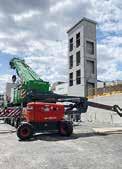

Royston Scaffolding Ltd were on hand to help the NHS by providing essential work for St Michael’s hospital in Bristol during the Covid-19 lockdown. With social distancing restrictions and tight on-site measures put in place by the NHS, the scaffolding work took longer to construct than usual – but, even in extreme conditions, it was possible to continue.
The project involved building various structures to enable the pipework in the boiler room to be changed safely. The team originally began work just before lockdown. As a result, the site was cleared temporarily until it was determined how work could continue safely. Then, a team of three travelled in separate vehicles with a letter from the hospital outlining the essential work. This came in handy as the lorry carrying all the scaffold equipment was stopped and checked by police!
Power at the hospital was turned off for nine hours at a time to enable engineers to conduct their work
safely. So, it was essential that the scaffolding crew built the structures quickly in time for this window. The largest scaffolding was a lifting frame structure, that allowed the engineers to lift the new pipework up and slide them through a hole in the wall on a Niko Track system.
The team adhered to the 2m social distancing rule and followed a one-way system throughout. And in addition to wearing their normal PPE the team also wore face coverings. Although the work took longer than planned, the Royston Scaffolding team were able to complete the structures in time for the engineers to conduct their work.
FIND OUT MORE roystonscaffolding.com
www.safety-health-expo.co.uk
ExCeL, London
NEWS NEWS NEWS accesspoint.org.uk accesspoint.org.uk P4 P5
COMMENT OPINION
Navigating our way through Covid-19
In this Comment piece, Robert Candy, CEO of the Scaffolding Association, talks about the uncertain journey that our sector must now travel.
Having provided unprecedented financial support to businesses during the Covid-19 pandemic, the Government is now releasing the country from lockdown in its bid to stimulate the economy and achieve some sort of normality. The 2-metre social distancing rule is to be dropped in favour of a 1-metre-plus strategy, we will be able to socialise in groups of six, and a week in the South of France may no longer be just a dream!
Many will be relieved at the easing of these measures, seeing light at the end of the tunnel having struggled through lockdown – others will rightfully feel concerned by the speed at which the changes are being implemented and fear a spike in infections. The virus is by no means defeated – some areas around the world are experiencing significant rises in reported cases, with worrying clusters appearing throughout mainland Europe. Most of the UK population seem to be continuing careful behaviour, but over-packed beaches and unlicensed parties gain much media coverage.
The scaffolding industry appears to have had varying levels of success throughout the pandemic. Some contractors have struggled to survive having already been teetering on the edge of failure prior to the implementation of the lockdown. Unfortunately, this is not a big surprise – being regularly beaten down on price, subjected to poor payment practices by clients and finding their overheads unmanageable, it is sadly inevitable that some would ‘throw in the towel’.
Most companies have been able to remain operational, having gained access to Government funding and taken advantage of the CITB Levy suspension to ease cashflow. But while remaining open they have had to implement a myriad of changes and ensure that they are clearly communicating enhanced safety provisions with their staff and supply chain.
There have been some wonderfully inspiring stories of scaffolding companies doing their utmost to make a positive contribution to society – donating PPE stocks to the NHS, using contacts to import face masks from China, raising funds for food bank charities and working on important projects to support key infrastructure. I feel that our sector has presented itself in a light that can only enhance our standing in the wider construction community.
A number have exploited the opportunity that the pandemic presented to re-evaluate, re-position and even strengthen. Scaling back operations has allowed some companies to re-think their operational strategy, streamline their processes and develop business contingency and continuity plans that will make them much more resilient in the future.
One thing that remains sure is that the financial support that the industry has benefited from to survive from March until June will have to be paid back at some point in the future. We must hope that the nation’s economy can steady itself, recover, and grow again.
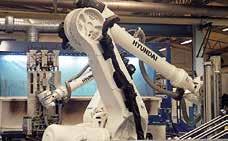 Robert Candy
CHIEF EXECUTIVE, SCAFFOLDING ASSOCIATION www.scaffolding-association.org
Robert Candy
CHIEF EXECUTIVE, SCAFFOLDING ASSOCIATION www.scaffolding-association.org
Quality, integrity and sustainability in the scaffolding sector

In this Opinion piece, Priscila Escobar, Mechanical Design Engineer at HAKI, discusses the important considerations to be taken when sourcing scaffolding products.

Globalisation is allowing organisations around the world to be in dialogue with each other on an hourly basis. Although it is enabling businesses to keep connected from afar, on the flip-side it is exposing companies to the lure of cheaper materials, which are sometimes a far cry from the quality products they should be using. This is especially important in the scaffolding sector.
As well as falling behind in terms of quality, cheaper products also run the risk of being less sustainable. This can be a problem for many reasons, mostly because these products tend to have shorter lifespans and aren’t, necessarily, produced in accordance with the right sustainability requirements.
If sustainability and quality are therefore compromised, this can potentially have an impact on the soundness of a structure and could weaken the overall health of the environment. It is why it is essential to always select solutions which deliver on quality, safety and sustainability. A tight project time-frame shouldn’t have a negative impact on the quality of a build, nor the health of our natural world.
The pressures of time
The need for building quickly and at reduced costs, together with stringent health and safety regulations, means construction companies require access solutions that allow for quick erection whilst maintaining the highest standards. System scaffolding has, over time, proved itself to be the best answer to this challenge.

Safety first
Products that are designed to the highest standards enable safe and secure working conditions on all manner of complex projects including oil and gas, infrastructure sites, power generation sites and construction. State-of-the-art manufacturing facilities ensure the safe delivery of large volumes of accurately manufactured scaffolding components.
Quality products
Products should be thoroughly tested to ensure high strength and durability, while procurement should be traceable from raw material to finished component – factors which are a huge assurance to customers, as are an extended warranty and compliance with the international suite ISO 9001:2008, the standard for quality management.
A longer lifespan
Longevity and sustainability go hand-in-hand; it is vital to use products which last for longer. With quality products, which are engineered to the highest standards, longer lifespans will be achieved. This in turn means products can withstand long-term projects (for less downtime in replacing access) or be reused on future programmes without any concern regarding their performance.
Cheap but not-so-cheerful
Globalisation is serving an important function when it comes to keeping businesses and people connected. The downside to this is the prevalence of cheaper, imported goods which do not meet the scrupulous high standards of developed countries. When taking all these factors into consideration, it is clear to see why it is essential to invest in a scaffolding product which represents quality, integrity and sustainability.
Priscila Escobar MECHANICAL DESIGN ENGINEER, HAKI www.haki.com
COMMENT OPINION accesspoint.org.uk accesspoint.org.uk P6 P7
It is essential to invest in a scaffolding product which represents quality, integrity and sustainability.
Reaching the heights at City Quays 3
Paul Bright and Robbie Andrews were involved at the early stages, when finding a solution to erecting handrails in the safest and most economical way possible was key. This was achieved by welding handrail brackets to the steel works and erecting handrails at ground level for the steel erectors to erect as the scaffold was installed. This reduced the amount of working at height on the project. Advanced NI also erected safety ‘catch nets’ to the building for additional safety protection. All six internal lift shafts in the new building are scaffolded from top to bottom of the building. Safety, speed and versatility are at the heart of Layher’s scaffold systems. Its lightweight design means ease of transportation and assembly. Wide bay design with no crossbracing provides optimum access onto and around scaffold structure. And, if required, the system connects directly to stair towers, roofing, protection and accessories.
Robbie Andrews is the MD at Advanced NI Scaffolding: “This is a major contract for us to win and we’re delighted to be working on it alongside other locally based businesses. City Quays is a flagship development for Northern Ireland and will provide a major boost for Belfast.”
Farrans are the main contractor. Glenn Gilmore, Regional Director added: “Our team has been heavily involved behind the scenes and this contract win is testament to our professionalism and expertise.”
City Quays 3, in Belfast Harbour, is primed to be one of the largest Grade A office developments to be built in Northern Ireland.

Scaffolding Association member Advanced NI are providing the scaffolding structures for the 68 metres high main building.




The City Quays project is a £250m development regenerating 20 acres of ex-shipping land. In addition to ‘Grade A’ office space, there are also leisure, hotel and retail buildings, plus car parking.
Construction is estimated to cost £50 million, generating 600 construction jobs. Upon completion City Quays 3 will provide jobs for around 1,800 people. Near the River Langan and the M3 bridge, the site is beside City Quays 2, the home to Ulster TV and a number of other businesses.
accesspoint.org.uk
SITE REPORT SITE REPORT
P8 P9
Advanced NI has utilised the Layher Scaffolding System for the project and has erected a staircase as a means of secondary escape should the hoist breakdown. This is one of the advantages of choosing Layher for the job, as Advanced NI has been able to erect this staircase without problems and without additional materials to the base of the scaffolding, such as extra bracing, double legs with the system selected being so strong.
FIND OUT MORE www.advancedniscaffolding.com
Maintaining a sustainable cash flow
To put it mildly the construction industry is in very uncertain times and at this stage it is very difficult to predict what the future holds following the COVID-19 crisis.

What we do know is that the new ways of working (to provide greater safety for employees) will increase costs at the same time as revenue is depressed until we are operating at near to full capacity.


Unfortunately, there is evidence emerging of downward pressures on prices which will exacerbate the stress felt by many businesses. Therefore, cash flow is now more vital than ever before. This article aims to provide scaffolding firms with advice on how to be “ahead of the game”.
TIP 1
Always be sure of the entity you are dealing with –Registered Company, Limited Liability Partnership, Unlimited Liability Partnership or just an individual? If it’s a company, check its details with Companies House. Bodgit Builders Ltd could be registered in many guises such as Bodgit Builders (2015) Ltd or Bodgit Builders (Llanfairfechan) Ltd.
TIP 2
Credit checks are more important than ever but remember they could be out of date – the fortunes of businesses can change overnight.
TIP 3
Pricing of jobs is now even more problematic. I have already mentioned the increased costs associated with operating the new safety measures, such as social distancing (although I have no idea how this can be practised on typical scaffolding structures without increasing the board width). Be aware of possible problems associated with the future supply of materials and equipment and price hikes.
TIP 4
Seek, if possible, advance payments prior to arriving on site. You are likely to be refused but you should always ask.
TIP 5
When checking your contract or purchase order, the two most important parts are SCOPE OF WORK and the PAYMENT PROVISIONS.
TIP 6
Your SCOPE OF WORK should be as precise as possible. Do not provide the other party with an excuse not to pay for a variation by arguing that the work was in an (ill-defined) scope of work.
TIP 7
Study your payment provisions and draw up a schedule as per the table* below.
You can send the schedule to the other side.
N.B Point out that if the programme overruns then the dates will move forward in tandem with the dates in the existing schedule. (So that if 13 October is the date by which last payment is to be made it becomes 13 November).
TIP 8
If the start of work is delayed always warn that you may seek to recover any consequential costs such as storage.
TIP 9
If you are working on public sector works in England the law requires that all contracts and subcontracts must have 30-day payment clauses (Reg.113 Public Contracts Regulations 2015).
TIP 10
Keep on top of variations so that you are getting in your money as quickly as possible. Ensure that the instruction is issued by the person authorised to do so and is in writing.
TIP 11
Pursue delayed payments as soon as they become outstanding. If you have issued an application for payment and the other side has not issued any payment notices your application (provided it’s on time, in the right format and shows how you’ve calculated the amount) will become the amount payable. You can suspend your contracted obligations if due payments have not been made (section 112, Construction Act).
TIP 12
Always consider using the Late Payment of Commercial Debts (Interest) Act 1998. The interest rate is nothing to be sniffed at –it is 8% above 0.1% (Bank of England Base Rate).
*PAYMENT SCHEDULE TABLE TO ACCOMPANY TIP 7
date)
any pay less notice must be issued (must be issued before final date for payment)
COMMERCIAL FEATURE – COMMERCIAL accesspoint.org.uk
P10 P11
accesspoint.org.uk
Barrister Rudi Klein offers a dozen tips on safeguarding cash flow in a fragile economy.
Date Date
Date
Final Date for Payment 1 September 8 September 13 September 12 October
October
Date of Application Due Payment
of issue of Payment notice (no later than 5 days from the due
by which
13
Masons Scaffolding support housing development

The scaffold temporary works have been continuously monitored and amended throughout the project, due to the complexities of the exposed building and the requirement to meet the ever-changing calculations.

Masons Scaffolding was employed by Sloane Demolition to provide a full retaining scaffold during the demolition of the internal walls, floors and roof of the old manor house at Leybourne Grange. The project was to convert the Grade 2 listed buildings within the heart of the former Leybourne Grange Hospital grounds into luxury living accommodation.

Leybourne Grange is part of an exciting new housing development called Leybourne Chase, built in the grounds of and utilising the original buildings of a former manor house in the Kent countryside, just five miles from Maidstone. It’s a development of 1 and 2 bedroom apartments, and 2 and 3 bedroom houses, close to the historic town of West Malling. Works included a highly detailed and complex buttress scaffold incorporating a double width scaffold and internal and external beamed support to all window levels – both vertical and horizontal. Full span beam platforms were installed between main front and rear walls at roof level once the roof was removed and an access staircase together with kentledge bases drilled into a purpose built concrete foundation slab. The buildings were in much worse condition than originally anticipated, owing to poor maintenance and years of neglect. The manor house at Leybourne Grange dates back to around 1724 and the age of the building added considerable challenges to the project.
Due for completion in 2021, the project includes additional works to the clocktower and caretaker’s cottage, along with the library and ancillary buildings. These are being carried out directly for Taylor Wimpey, Masons Scaffolding having successfully met its supply chain requirements.
We have been working with the Scaffolding Association since 2015 and are proud to nsure many of the UK’s leading Scaffold companies.


We really understand scaffolding insurance and we love it. We have even employed some former scaffolders within our business so you can be 100% confident that we really do talk your language!

“It is testament to the Taylor Wimpey and Sloane Demolition teams who have worked tirelessly alongside Masons Scaffolding, that this challenging project is ultimately so rewarding,” says Grant Mason, MD at Masons Scaffolding. “We are tremendously proud of the scaffolding work it showcases.”
All that expertise, enthusiasm and industry knowledge means that you can trust Amicus to not only find the best insurance to protect you, your business and your employees, but that you can also rely upon us to do it at the most competitive price. We even offer additional discounts for Scaffolding Association and NASC members.
www.amicus-insurance.co.uk


Why not give us a try!
To discuss your insurance requirements, or to find out how we can help you contact Richard Evans, Rory Boylan or Adam Scott on 0208 773 5395 or email us at adam scott@amicus-insurance com www.amicus-insurance.co.uk Compass London Market Broker of the Year 2015/16
SITE REPORT SITE REPORT accesspoint.org.uk P12 P13
FIND OUT MORE www.masonsscaffolding.com
Scaffolding and Fleet Insurance by Scaffinsure
What are the costs of cybercrime?

Paul Beck from Direct Insurance Corporate Risks looks at cyberattacks on the scaffolding sector and what business operators can do to minimise the risk and counter the threat.
Even before the current pandemic, technology has long been redefining not only how we communicate with our staff, customers and stakeholders, but also how we do business day to day. Nearly every business relies heavily on technology to operate, whether it’s on banking systems for finance and wages, or on software to operate machinery and manufacturing.

As a business owner it is normal to insure our physical assets and liabilities, but now more than ever, business leaders also need to consider and assess the potential impact that cybercrime could have on their organisation, take measures to mitigate and prevent, and also learn how to recover should the worse happen.
WHAT ARE THE CHANCES?
– It’s estimated that nearly as many as 3 out of every 5 businesses could be the victim of a cybercrime in the next 12 months.
– You are nearly 20 times more likely to be the victim of a cyberattack than you are to be the victim of a theft or fire at your premises.
– The majority of cyberattacks exploit basic vulnerabilities in IT systems and software which can be readily corrected.


WHAT ARE THE RISKS TO MY BUSINESS?
– Theft of money.
– Reputational harm with suppliers and customers.
– Website or internal system breaches.
– GDPR Data breaches.


SHOULD SCAFFOLDING FIRMS CONSIDER CYBER INSURANCE?
Anyone who uses computers or the internet at work, holds data about customers, suppliers or employees, carries out online transactions, or just uses social media, should think about the potential for cybercrime, and consider using cyber insurance as part of their risk management strategy.
Unfortunately the majority of cyberattacks are not motivated or directed at specific businesses or individuals, but instead are the result of thousands of businesses targeted simultaneously to maximise the possibility of success for the hacker.
HOW CAN CYBER INSURANCE HELP?
Cyber insurance policies pay out to customers that have suffered an attack, much as a normal insurance policy would. But there is often also a service element to the product that provides hands-on help to customers whose systems have been attacked.
These services can include not only helping you at the point of an attack, but also in the provision of risk reports before you take out any insurance – these reports highlight areas immediately vulnerable to an attack, and provide advice on how to plug the gap.
HOW MUCH DOES CYBER INSURANCE COST?
Policies start from as little £150. If you would like a quotation or to discuss how cyber insurance can help scaffolding firms please contact your insurance broker.
WHAT CAN I DO TO PREVENT CYBERCRIMES AGAINST MY BUSINESS?

– Activate firewalls on all computers and devices connected to the internet.

– Use a reputable anti-virus service and ensure it automatically updates on a regular basis.
– Maintain strong passwords, and enforce strict password rules where possible (don’t use a single password for multiple sites or computers).
– Activate two-factor authentication for hosted services.



– Remove unused user accounts (previous staff members, for example).

– Ensure only administrators are granted full administrative access to computers/systems.
– Regularly update the software on all systems.

Paul Beck is Managing Director at Direct Insurance Corporate Risks. Find out more www.dicr.co.uk
Scaffinsure is a dedicated provider of Insurance to the Scaffolding and Access Industry.
What do we do? At Scaffinsure we won’t just sell you insurance.
• Public Liability - high limits available and we can even provide cover for high risk locations (eg asbestos and Rail side work) and all with A rated insurers.
• Employers Liability - Covering your direct and indirect workforce.
• Professional Indemnity - Even if you don’t do your own design and drawings, you can unwittingly incur a design liability - our experts will explain how to minimize the risk. We’ve developed an affordable insurance solution to cover your liabilities and any associated defence costs.
• Motor Fleet and vehicles - As insurance partners to the RHA, we know a thing or two about motor insurance. We can help you manage your risk, reduce your claims costs and keep your premiums down.
• Cyber insurance
• Directors and officers cover and much more
To discuss your insurance requirements give us a call on 01277 844 396 or email info@scaffinsure.co.uk
FEATURE – COMMERCIAL COMMERCIAL accesspoint.org.uk accesspoint.org.uk P14 P15
We want you to think of us as your in house
insurance department. We can help with the following -
Scaffinsure is a trading style of Direct Insurance Group, a multi aceted insurance and reinsurance provider with offices throughout the wor d Scaffinsure is a trading name of Direc Insurance Group Plc wh ch is au hor sed and regulated by the F nancial Conduct Au hority
Associate Member
St Patrick’s Cathedral project update




AccessPoint issue 12 featured the impressive mobile roof scaffolding in place to assist the renovation of St Patrick’s Cathedral in Dublin. Here is an update in pictures…





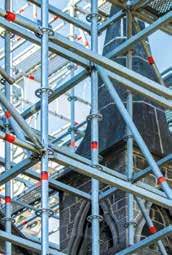



Ainscaff Scaffolding, a Scaffolding Association member, has been responsible for designing and erecting this important temporary structure. Ainscaff has been in the scaffolding business for a decade and works with a range of private and public clients, including many large organisations. The conservation works are being undertaken by Clancy Construction under the supervision of the cathedral architect, John Beauchamp of B2 Architects.

SITE UPDATE accesspoint.org.uk P16 P17 SITE UPDATE
Reality bites for the construction sector
After three consecutive months in which construction contract awards defied all logic and exceeded all expectations, the severity of the COVID-19 crisis has finally caught up. Builders’ Conference CEO Neil Edwards reports on the dawning of what could be the new normal, and looks for glimmers of hope on the horizon.
During late 2019 and early 2020, the UK construction industry delivered unprecedented levels of new contract awards, peaking with £7.8 billion in March and £9.7 billion in April. In May, however, the reality of the pandemic bit. And bit hard. The resulting fall in both the quantity and the value of new contract awards in this month was as severe as it was unsurprising; closing at £3.9 billion and falling just short of the £4 billion that had become the sector norm. Just 232 companies reported new work compared to the 350 to 400 that has become the established monthly norm.
London was the top regional winner, with 61 new contracts valued at £596 million. However, with more than half a billion pounds in new contract awards, Yorkshire came a close second. The positions had been reversed in April as Yorkshire’s position as a growth hot-spot peaked. Scotland and Northern Ireland suffered particularly badly, with new contract awards plummeting to just £128 million and £4 million respectively to further underline the impact of the COVID-19 crisis.
It would therefore appear that, although there are regional variations, the industry’s resilience has finally been broken. For more than two years now – allowing for a few seasonal blips and unseasonal anomalies along the way - the UK construction industry has grown accustomed to a monthly norm of around £4 billion of new contract awards. But with the COVID-19 effect now visited upon the sector, a new norm of less than £4 billion might have just been established.
A new norm in which work is more scarce, margins are noticeably thinner, and in which enforced value engineering, re-pricing and retendering could be the order of the day. It is worth remembering that, during the heavy recession that the country suffered during 2008 and 2009, the value of new contract awards regularly struggled to make it to and beyond the £1 billion per month mark; and each new economic jitter sent that figure lower. So to have a likely monthly figure of just below £4 billion might offer some comfort.
A considered look back across figures during January to April 2020 shows that there are some reasons for cautious optimism. During March, when the COVID-19 lockdown began, the UK construction industry delivered nearly £8 billion in new contract awards. And in April the sector went further still, recording a staggering £9.7 billion, although the number of new contract awards was nearly 25% down compared to March. Such a figure would have been remarkable even in the middle of an industry boom. But arriving as it did amidst a global pandemic, it offers just a glimmer of optimism for an upswing in workloads when the lockdown ends and more normal working practices can resume.

There will, of course, be concerns over the industry’s ability to convert all these contract awards into living and breathing construction work from July onwards. In all likelihood, there will be a continued shortage of building materials for some time while manufacturers ramp up production. A staggered return to work of staff to comply with social distancing measures is sure to compound the existing skills shortage. And there will likely be a training lag as workers update competence cards that expired during the lockdown. But the Builders’ Conference together with its unique BCLive league table deal only in facts. And the fact is that the UK construction industry picked up £20+ billion in new contract awards from March to May. That alone is surely reason for some cautious optimism. Never before has Builders’ Conference independent, verified real-time, construction information and research been more important in allowing the construction industry to play a significant role in how the UK economy emerges from these unparalleled circumstances due to COVID-19. Ensure your business has access to evidenced based construction project information from across the UK by becoming a member of the Builders’ Conference. FIND
www.buildersconference.co.uk

Suspension trauma describes the position the worker has fallen into whilst using personal fall arrest systems and become unconscious.
Audited and assessed membership of the Scaffolding Association now includes access to the Builders’ Conference platform –with premium information about 11,000 UK construction projects.
Marcus Rose of SMAS Worksafe talks to us about how scaffold contractors should ensure they develop a clear and visible Rescue Plan that identifies the procedures for dealing with a conscious and unconscious casualty if a fall occurs.


If a fall does occur in the workplace, you must be confident that you have appropriate fall arrest equipment in place to mitigate the consequences and distance. You need to evaluate and place suitable controls that ensure workers are protected in case of a medical condition such as a heart attack, injury or slip, trip or fall.
WHAT FALL ARREST DEVICES ARE AVAILABLE?
When addressing the hierarchy of control, you must mitigate the distance and consequence of a fall using collective control measure equipment, depending on the type of work you are undertaking this could include airbags and safety nets, or personal fall arrest systems.
A scaffolder’s personal fall arrest system would predominantly be a harness and lanyard. These will not prevent a fall happening but will minimise distance and injury. The wearer needs to ensure a free fall distance of two meters to enable selfrescue or aided by others. You need to consider this when developing your Rescue Plan, alongside providing appropriate rescue training to users and keeping records of who needs to be contacted in case of an emergency.
A suspended fall can cause additional injury when impacting the scaffold structure or by the tightness of the harness when suspended. Lanyards need to be attached above the worker and capable of withstanding the load and shock created by the user during a fall, and additional aids like safety lines and inertia reels must be considered for recovery. Any fall arrest equipment you use should conform to the relevant British Standards and CE marks, so undertake some research on what you are purchasing.
WHAT IS SUSPENSION TRAUMA?
Suspension trauma describes the position the worker has fallen into whilst using personal fall arrest systems and become unconscious. The loss of consciousness is not due to physical injury, but as a result of vertical suspension and the change of blood flow when becoming trapped in the harness. It can result in physical irregularities such as swelling in the legs or an irregular heart rhythm. The reduced blood flow leads to nausea, unconsciousness and a drop in blood pressure causing circulatory shock. This can cause serious brain and organ damage, and can ultimately result in death.
WHY DO I NEED A RESCUE PLAN?
The Working at Height (WAH) Regulations 2005 require all equipment to undergo pre and post use checks, interim checks, and a thorough recorded inspection regime be in place. Those undertaking inspections must be competent, having received appropriate training. If a fall does occur, the equipment must not be used again. INDG367 Inspecting fall arrest equipment made from webbing or rope provides advice on inspection regimes.
The WAH Regulations 2005 require a Rescue Plan that details dealing with emergencies and rescuing conscious and unconscious casualties. From this you will be able to identify the level of first aid provision you require and how to liaise with the emergency services. As an employer, it is your responsibility to ensure that your plan is appropriate to the works and that those involved are trained in the process.
FEATURE – COMMERCIAL FEATURE – HEALTH AND SAFETY accesspoint.org.uk accesspoint.org.uk P18 P19
OUT
MORE
Don’t get caught out – suspension trauma could be fatal
FIND OUT MORE www.smasltd.com
JS Safety Associates
ESTABLISHED 2004
JS Safety Associates are a team of highly qualified consultants with practical experience, working within technical and safety standards and regulations to provide a solution to every scaffolding issue.


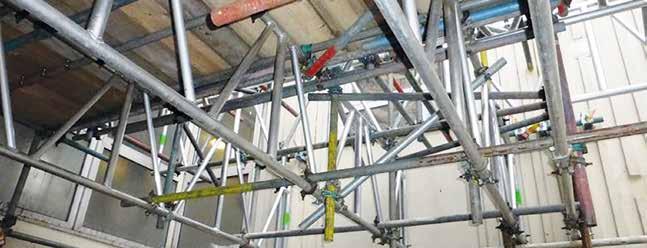
Associate Member





Tel: 07792 271308 Email: jssaoffice@gmail.com

www.jssafetyassociates.com

Float your scaffolding
An award-winning Cornish-based start-up has developed and patented a new product called ScaffFloat – a set of tough plastic floats that have been specifically designed to integrate with standard scaffolding parts to make floating pontoons, rafts and versatile floating structures. The company has been testing the system in the field over the last few months and now their initial R&D work has been completed, they are starting to introduce the product to the market, take bookings and are actively looking for UK scaffolding companies that are keen to offer floating access solutions to their customers.

Here at AccessPoint we’re always on the look-out for new, innovative and exciting scaffoldrelated products and applications that will be of interest to our readers. Here’s a development that really intrigued us…

and win tenders. We are also always on the end of the phone to offer advice. Category 3 checks can also be provided for larger projects.”
The company says that safety is key, so to help make sure all ScaffFloat pontoons and structures are professionally built to an approved set of drawings, they are currently only hiring their floats. Float hire prices start at £1.90 per day on longterm hire, or £3.90 per day on short-term hire.
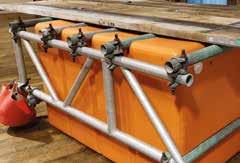
The floats are designed to integrate with popular 450 and 750 lattice beams, and then use standard tube lengths, forged double couplers and scaffold boards. The smallest pontoons start at 4m x 4m and can scale up to almost any size.

Uses for ScaffFloat span several sectors including survey, drilling, geotechnical, renewables, oil and gas, civils, events, disaster relief and access. As well as standard flat top pontoons, the company is currently testing a range of ‘bolt-on’ modules that include spud legs, propulsion, welfare huts, lifting A-frames, deck cranes and loading ramps.
Particular interest has also been shown for bridge projects, where pre-built structures can
either be floated underneath and lifted into place, or a ScaffFloat pontoon can be lifted up under the bridge to provide access for repair works, or for scaffolders to install scaffolding. And there are already companies out there actively promoting this new equipment. Roger Tice, Managing Director of Richter Associates, said: “We are a firm of consulting civil, structural and geotechnical engineers that specialise in temporary works and construction sequences. We are actively working with the ScaffFloat team and offer design solutions to our customers using this innovative system. We can see all sorts of exciting applications for this within the industry we serve, and in most cases, there are very significant cost savings to be had.
48.3 Scaffolding Design Limited – a Richter group company dedicated to the scaffolding market – is proudly working with ScaffFloat, and bringing this system to its existing client base. We endorse this system created by ScaffFloat.”

For more information, or to register your interest as an Approved Delivery Partner visit www.ScaffFloat.co.uk

Toby Budd, Founder and MD said: ‘“We are already speaking to a number of scaffolding companies who are interested in becoming Approved Delivery Partners. After a signed agreement has been put in place, and we have provided the necessary training, they can hire floats from us and use them to start building pontoons for their customers. The interest has been much stronger than we expected.”
He added, “We appreciate that most scaffolders are not familiar with floating structures, so, as well as hiring them the floats, we provide an in-house design service. All our pontoon designs come with full structural, buoyancy and stability calculations and we are happy to produce renders and drawings FOC to help our partners bid for
PRODUCT NEWS accesspoint.org.uk P21 PRODUCT NEWS accesspoint.org.uk P20 SCAFFOLDING SERVICES ✚ HEALTH AND SAFETY SERVICES ✚ ✚
Do you need SSIP? “Great advice, easy to complete”
697370 www.smasltd.com
An 8m x 4m ScaffFloat pontoon undergoing tests in a wave tank
01752
Trusted by
Reactec creates social distancing solution for workers
Edinburgh-based Reactec has re-purposed its proven system for monitoring workers’ exposure to health risk to create “Safedistance”, which enables employers to manage the social distancing of their workforce within construction. Safedistance is based on an industrial grade wrist-worn device and it:

• Alerts workers if they have strayed to within two metres of a colleague

• Informs employers of the frequency and severity of breaches of social distancing protocols
• Can assist with contact tracing of those who have been close to employees subsequently displaying COVID-19 symptoms
• Can facilitate contact tracing across employers on busy infrastructure projects

• Ring fences work teams who need to work more closely together in controlled cohorts

• Can be expanded to enable real time intervention by a supervisor in the event of social distancing breaches
More than 45,000 of Reactec’s Hand Arm Vibration (HAV) monitor, HAVwear, on which Safedistance is based, are already in circulation in the UK. Reactec is offering to enable these devices remotely by adding the safe distancing software free of charge – meaning that its existing clients can ensure safe distancing of employees while also continuing to protect them from harmful vibration.
Reactec mobilised it’s innovation team to re-purpose its product offering and development work that would normally take months was completed in 15 days, allowing Reactec to test and launch Safedistance in record time. The product works by using Bluetooth enabled Reactec devices
to detect other Reactec devices within a two-metre range. Should users become closer than two metres apart, both device users are warned with both vibration and audio alerts.
The device is returned to its recharging docking station at the end of each shift, at which point details of any safe distancing breaches are uploaded to the Cloud and combined with other data to produce employer reports to assist in the management of social distancing. All data use is entirely GDPR compliant. The system can be expanded to provide realtime transmission of distancing breaches to enable supervisors to act immediately in managing social distancing.
FIND OUT MORE www.reactec.com
‘Scaffshirt’ helps scaffolders shoulder the load
If your company has a new product that is of interest to the access and scaffolding sector contact the team at AccessPoint and we could feature it in the next issue.
Sanibucket helps you keep safe throughout the working day
Gaaard Protection Ltd, based in Bradford, West Yorkshire has designed and developed the Scaffshirt range of workwear – offering extra protection for scaffolders carrying loads on their shoulders while meeting the stringent Health and Safety criteria set for manual handling.
Scaffshirt is a versatile, high quality hi-vis protective workwear shirt incorporating an extremely durable, long lasting EVA pad system, maintaining ISO EN 20471 requirements for safe site work. Outlasting standard garments, Scaffshirt promises to keep your personnel looking better for longer.

The company used 3D CADCAM software and a focused approach to combine modern materials with an ergonomic design, developing a compact pad with the ability to withstand impressive loading.
During testing a Scaffshirt pad was compressed over 2,800,000
cycles to 3mm and a 25 tonne truck was driven over it – view the video at www.gaaardprotection.com
Scaffshirt benefits from showerproof, hard wearing pocket material that holds the pad securely with finite adjustment for different shoulder profiles.
Gaaard Protection offer in-house embroidery and printing, letting you add your company branding to the shirt to enhance a scaffolder’s professional appearance.

As well as the scaffolding sector, Scaffshirt looks set to become popular across all construction, rail, telecoms, gas and oil industries, as the alleviation of discomfort and increase in productivity appeals to operatives and business owners alike.
FIND OUT MORE www.gaaardprotection.com
As scaffolding company employees start returning to site the challenge that they and their employers face is how to do this in a manner that protects them and others from the risk of Covid-19. Armada are offering a solution – the individual sanitisation pack, which they have named ‘Sanibucket’.
Sanibucket is a sturdy bucket with lid and handle, filled with a range of useful items such as hand sanitiser, face masks, anti-bacterial wipes, latex gloves, tissues and cleanroom tape for marking out social distancing.

Sanibucket also provides space to personalise for individuals. Current customers are providing a Sanibucket for each company vehicle –to help protect whoever goes out – although dedicating a bucket to each employee is another option.
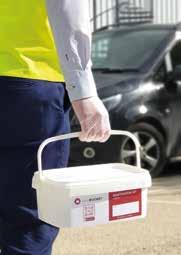
The Sanibucket is available to buy now, on a 3-4 day delivery time. A discount is available for orders of over 11 buckets and again over 119 buckets.
FIND OUT MORE www.armadadh.com/product/armada-bucket
LFI TuFF Steel ladder: Designed with scaffolding in mind


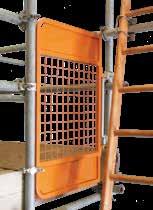
As the changes to EN131 (the standard that governs the design, strength and testing of ladders in the UK and Europe) have taken a hold there has been a greater need to offer clarity on ladder durability and user expectations.
Fourth generation family business LFI, based in Gloucestershire, have recently re-branded and segmented their product range to help users select the right products for their work. Alongside their Pro and Home range, they have relaunched their TuFF range of products, which are made from larger profiles and stronger materials, making them suitable for frequent use in tough construction environments.
Most notably for scaffolders: The TuFF Steel is a heavy duty steel pole ladder certified to EN131:2010 and A2:2012 standards with a maximum load and duty rating of 150kgs.
Made from precision engineered steel with a Galvalume coating inside and out, the ladder is corrosion resistant (with no need for caps to hide rust!).

The non-sparking finish is suitable in a potentially
flammable environment, and more durable than paint or epoxy alternatives.
Manufactured from cold-rolled steel for maximum strength to weight ratio, the TuFF Steel is available in lengths up to 8m and comes with a 10 Year Manufacturer’s Warranty.
Ben Walker, MD says “It’s exciting times for LFI who are well known as a long-standing premium supplier of strong, dependable products into the construction industry.”
FOR MORE INFORMATION
CONTACT andy.ferris@ lfi-ladders.co.uk
Left:
PRODUCT NEWS accesspoint.org.uk P22 PRODUCT NEWS accesspoint.org.uk P23
Right: The TuFF Steel ladder for scaffolding
The EssGee Safety Gate and EssGee Steps


Membership of the Scaffolding Association is an assurance of competence and quality recognised throughout the construction industry – it demonstrates an ability to carry out safe design, installation and commissioning of scaffolding systems. By using a Scaffolding Association member, clients can be confident that they are prequalifying and awarding work to contractors who have undertaken a rigorous assessment of their experience and capabilities. Join the friendly, fast-growing, not-for-profit, independent trade organisation today. Support that delivers Listening to business concerns, guiding safe working, pushing for work opportunities. Call us: 0300 124 0470 www.scaffolding-association.org Company members Audited and assessed membership now includes access to premium information about 11,000 UK construction projects via the Builders’ Conference platform. NEW 440













 Robert Candy
CHIEF EXECUTIVE, SCAFFOLDING ASSOCIATION www.scaffolding-association.org
Robert Candy
CHIEF EXECUTIVE, SCAFFOLDING ASSOCIATION www.scaffolding-association.org

































































